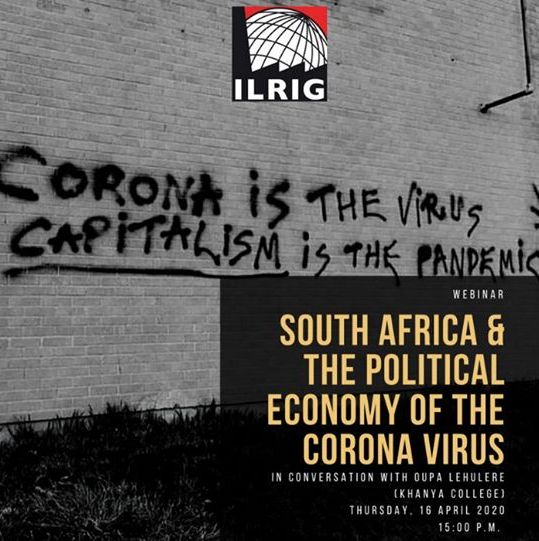LISTEN TO THE RECORDING HERE. READ OUPA’S PRESENTATION HERE.
You are invited to a Zoom webinar.
When: Thursday, 16 April 2020, 3PM SAST
Topic: South Africa and the Political Economy of the Coronavirus
Read Oupa Lehulere’s Article ‘The President, The Finance Minister and the Economists’.
Register in advance for this webinar here.
In the midst of the coronavirus pandemic that has engulfed the world and which is now spreading rapidly in South Africa, it is crucial to locate the outbreak and associated responses within the globally and nationally dominant political economy of capitalist neoliberalism. While there is a broad and emerging consensus around the necessary, practical health-related measures that need to be taken to try and contain the pandemic there is serious and growing divergence around the political, social and economic framing, application, content and impact of those and related measures. Nowhere are these divergences more apparent than in the most unequal country in the world, South Africa.
It is against this backdrop that the International Labour and Research Information Group (ILRIG) is hosting this webinar. Long-time political-social activist, writer and present Director of Khanya College, Oupa Lehulere, will be speaking to the political economy of the coronavirus in South Africa, with direct reference to his recently published article (attached) entitled – ‘The President, the Finance Minister and the Economists’.
In addition to a macro-analysis and in the spirit of critical debate, Oupa will specifically address: the criticism that his critique/approach is removed from the realities of what is possible right now (economically, politically and organisationally); the argument that such a critique/approach will undermine efforts to unite people, organisations and struggles that have been thrown up by the pandemic and is just another example of ‘left’ extremism and abstentionism; and, the practical political, social and economic alternatives there are to the current path being followed by the SA government and more particularly, what progressive civil society organisations and activists should be doing.
[WEBINAR] South Africa and the Political Economy of the Coronavirus
